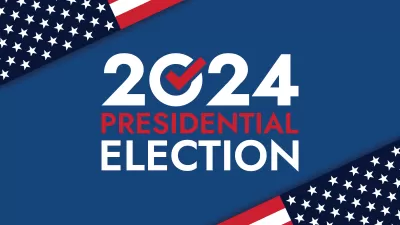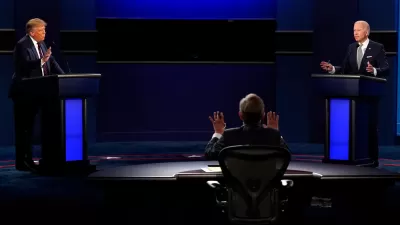In this election, Scranton has come to symbolize blue-collar America, with visits by all four national candidates, parodied on Saturday Night Live, as well as the scene of NBC’s The Office. But the city is in a turnaround after decades of decline.
"Don't be telling me that I'm part of the Washington elite, because I come from the absolute worst place on Earth: Scranton, Pennsylvania," said Saturday Night Live's Jason Sudeikis, playing Sen. Biden. "It's a hellhole! It is just an awful, awful sad place filled with sad, desperate people with no ambition!"
"But life in Scranton is more nuanced than the cliché of a once-powerful industrial center in decline. The population here is growing for the first time in 60 years, following a decades-long exodus that halved the city to barely 70,000 people. Its architecturally distinctive downtown, long vacant, is undergoing a dramatic renovation. The century-old "Electric City" sign -- dark for decades -- shines again above the town square.
Once influential, Scranton was the 38th most-populous American city in 1900, with its coal and iron proceeds putting it near the top in per-capita income. It erected an array of architecturally magnificent buildings, and introduced the nation's first electric trolley, giving rise to its "Electric City" nickname. While the rest of America prospered after World War II, fast-shrinking Scranton became known as the armpit of Pennsylvania, a designation it has never entirely shaken. Its median household income remains nearly $7,000 below the national average.
As a swing town in a swing state, Scranton could help determine the outcome of the election. The electorate here is more than 90% white, heavily Catholic and traditionally Democratic, although it leans to the right on social issues."
FULL STORY: Behind a Blue-Collar Cliché

Planetizen Federal Action Tracker
A weekly monitor of how Trump’s orders and actions are impacting planners and planning in America.

Map: Where Senate Republicans Want to Sell Your Public Lands
For public land advocates, the Senate Republicans’ proposal to sell millions of acres of public land in the West is “the biggest fight of their careers.”

Restaurant Patios Were a Pandemic Win — Why Were They so Hard to Keep?
Social distancing requirements and changes in travel patterns prompted cities to pilot new uses for street and sidewalk space. Then it got complicated.

Platform Pilsner: Vancouver Transit Agency Releases... a Beer?
TransLink will receive a portion of every sale of the four-pack.

Toronto Weighs Cheaper Transit, Parking Hikes for Major Events
Special event rates would take effect during large festivals, sports games and concerts to ‘discourage driving, manage congestion and free up space for transit.”

Berlin to Consider Car-Free Zone Larger Than Manhattan
The area bound by the 22-mile Ringbahn would still allow 12 uses of a private automobile per year per person, and several other exemptions.
Urban Design for Planners 1: Software Tools
This six-course series explores essential urban design concepts using open source software and equips planners with the tools they need to participate fully in the urban design process.
Planning for Universal Design
Learn the tools for implementing Universal Design in planning regulations.
Heyer Gruel & Associates PA
JM Goldson LLC
Custer County Colorado
City of Camden Redevelopment Agency
City of Astoria
Transportation Research & Education Center (TREC) at Portland State University
Camden Redevelopment Agency
City of Claremont
Municipality of Princeton (NJ)





























